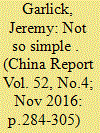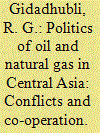| Srl | Item |
| 1 |
ID:
098631


|
|
|
|
|
| Publication |
2010.
|
| Summary/Abstract |
Support vector regression (SVR) had revealed strong potential in accurate electric load forecasting, particularly by employing effective evolutionary algorithms to determine suitable values of its three parameters. Based on previous research results, however, these employed evolutionary algorithms themselves have several drawbacks, such as converging prematurely, reaching slowly the global optimal solution, and trapping into a local optimum. This investigation presents an SVR-based electric load forecasting model that applied a novel algorithm, namely chaotic ant swarm optimization (CAS), to improve the forecasting performance by searching its suitable parameters combination. The proposed CAS combines with the chaotic behavior of single ant and self-organization behavior of ant colony in the foraging process to overcome premature local optimum. The empirical results indicate that the SVR model with CAS (SVRCAS) results in better forecasting performance than the other alternative methods, namely SVRCPSO (SVR with chaotic PSO), SVRCGA (SVR with chaotic GA), regression model, and ANN model.
|
|
|
|
|
|
|
|
|
|
|
|
|
|
|
|
| 2 |
ID:
148509


|
|
|
|
|
| Summary/Abstract |
China’s rise to the status of a global power is a very complex phenomenon. Yet students of international relations (IR) are taught that a good theory should be ‘parsimonious’, meaning that it should explain a lot with a little. In relation to China’s rise, the problem with theoretical parsimony may be not what it includes but what it leaves out. This article argues that lack of explanatory breadth and depth in connection with China’s IRs demonstrates a shortcoming in mainstream IR theories such as neorealism, offensive realism and constructivism. A candidate for an IR theory which explains more with more is complexity theory (CT), which utilises a conceptual toolkit including non-linearity, feedback effects, emergent properties and complex adaptive systems. CT’s toolkit, already used in the natural sciences, seems a good candidate to explain the hard-to-predict phenomena that emerge in the international sphere, but has not yet been developed into a clear theoretical lens in IR. In this article, the rise of China is analysed through the lenses of three mainstream theories and CT in order to assess the strengths and shortcomings of each approach and to suggest how CT’s ‘conceptual toolkit’ might be utilised to flesh out existing IR theories in order to explain China’s rise more fully.
|
|
|
|
|
|
|
|
|
|
|
|
|
|
|
|
| 3 |
ID:
059481


|
|
|
|
|
| Publication |
Oct-Dec 2004.
|
|
|
|
|
|
|
|
|
|
|
|
|
|
|
|
| 4 |
ID:
157659


|
|
|
|
|
| Summary/Abstract |
This article examines the main spheres of scientific and technological cooperation between Russia and China in the early 21st century and its significance for innovative development. It notes the comprehensive character and variety of forms of this cooperation, which the author believes should be dominated by basic science. Among outstanding problems the author singles out differences in the views on the role of science in partner countries, unsatisfactory results of the Russian Academy of Sciences reform in 2013-2016, and insufficient financing of Russian science.
|
|
|
|
|
|
|
|
|
|
|
|
|
|
|
|